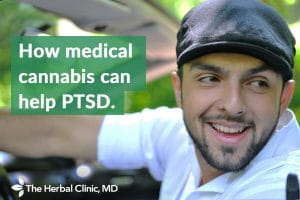Medical Cannabis for Clinically-Diagnosed PTSD

What is PTSD?
PTSD can occur after a stressful event or life-threatening occurrence. Though common in veterans after combat, other typical causes of PTSD may include car accidents, earthquakes or hurricanes, or sexual assault. After such an event, it is normal to experience lack of sleep and or mental reminders of the event. It may be difficult to do regular day-to-day activities like going to work, school, or even getting out of bed. While these symptoms are normal after a traumatic event, continual symptoms for more than a few weeks can be PTSD (symptoms can also come and go over time). It is important to consult a doctor if you think you have post-traumatic stress disorder.
Who suffers from PTSD?
While usually triggered by a very traumatic event or an injury that occurred during a life-threatening event, PTSD can happen to anyone. PTSD, sometimes out of anyone’s control, can cause depression and difficulty performing regular tasks. Factors such as: previous traumatic events, age, and gender, can affect the likelihood of PTSD. What occurs after a traumatic event is also a great influence on PTSD. For example, if a veteran goes to counseling or social groups, where other veterans can relate, PTSD may not occur.
Depression and PTSD
The National Institute of Mental Illness states that, in the U.S., about 14.8 million adults suffer from major depression. Depression can be a normal reaction to life struggles, losing a loved one, a life-threatening event, or an injury to your self-esteem. Depression can be caused by intense sadness based on feeling helpless, hopeless, and worthless that can last weeks or even months. These symptoms can keep people from functioning normally or unenthused about doing daily activities. Depression can feel like you’re in a bubble and you could be in that bubble for an extended period of time. Depression can occur in patients who suffer from PTSD who should seek professional help.
Symptoms of PTSD
Symptoms of PTSD usually occur soon after the event happens, but they may not be noticeable for months or even a year after the event (these symptoms can also come and go). If the symptoms occur for several weeks and causes difficulty to your everyday life, then you may have PTSD and you should consult a professional.
According to the U.S. Department of Veteran Affairs, there are four types of symptoms of PTSD, but they may not be exactly the same for everyone. Each person experiences symptoms in their own way.
- Reliving the event (also called re-experiencing symptoms). You may have bad memories or nightmares. You even may feel like you’re going through the event again. This is called a flashback.
- Avoiding situations that remind you of the event. You may try to avoid situations or people that trigger memories of the traumatic event. You may even avoid talking or thinking about the event.
- Having more negative beliefs and feelings. The way you think about yourself and others may change because of the trauma. You may feel guilt or shame. Or, you may not be interested in activities you used to enjoy. You may feel that the world is dangerous and you can’t trust anyone. You might be numb, or find it hard to feel happy.
- Feeling keyed up (also called hyperarousal). You may be jittery or always alert and on the lookout for danger. Or, you may have trouble concentrating or sleeping. You might suddenly get angry or irritable, startle easily, or act in unhealthy ways (like smoking, using drugs and alcohol, or driving recklessly.
How can medical cannabis help clinically-diagnosed PTSD?
Conventionally, PTSD can be treated by therapy, by attending social groups focusing on PTSD, or medication. The method of treatment can be based on the cause of PTSD. However, medical cannabis in Florida is being used to treat clinically-diagnosed PTSD, Medical studies suggest that an unbalanced level of endocannabinoid function (found in the brain) can cause PTSD. Studies also show that medical cannabis can help restore normal endocannabinoid function and reduce the symptoms of PTSD by the cannabinoids found in medical cannabis that are therapeutic. Medical cannabis can increase brain activity to normal levels to bring back joy to once enjoyed activates, increase appetite, reduce re-experiencing symptoms, increase energy, reduce thoughts of suicide, increase happiness, and much more.
Medical cannabis can come in many different forms to treat clinically-diagnosed PTSD and restore balance in brain activity. Legal forms of medical cannabis in Florida include: capsule, vapor, spray, edible, or even dissolvable strips. Depending on the strain’s potency and the method used, the reaction time may be longer or shorter. For example, a pill could take up to an hour whereas inhaling the plant can help within minutes or even seconds. Consulting a doctor about your PTSD symptoms will dictate which form of medical cannabis is best for the type of PTSD you have.
How can I get medical cannabis for clinically-diagnosed PTSD?
Our office in Tampa, FL is here to help you get back on your feet and back to normal balance. To find out how to get medical cannabis in Tampa, Florida read our other blog (How to Get Medical Cannabis in Florida). You can also contact us by clicking here or call us at (727) 202-4325.
